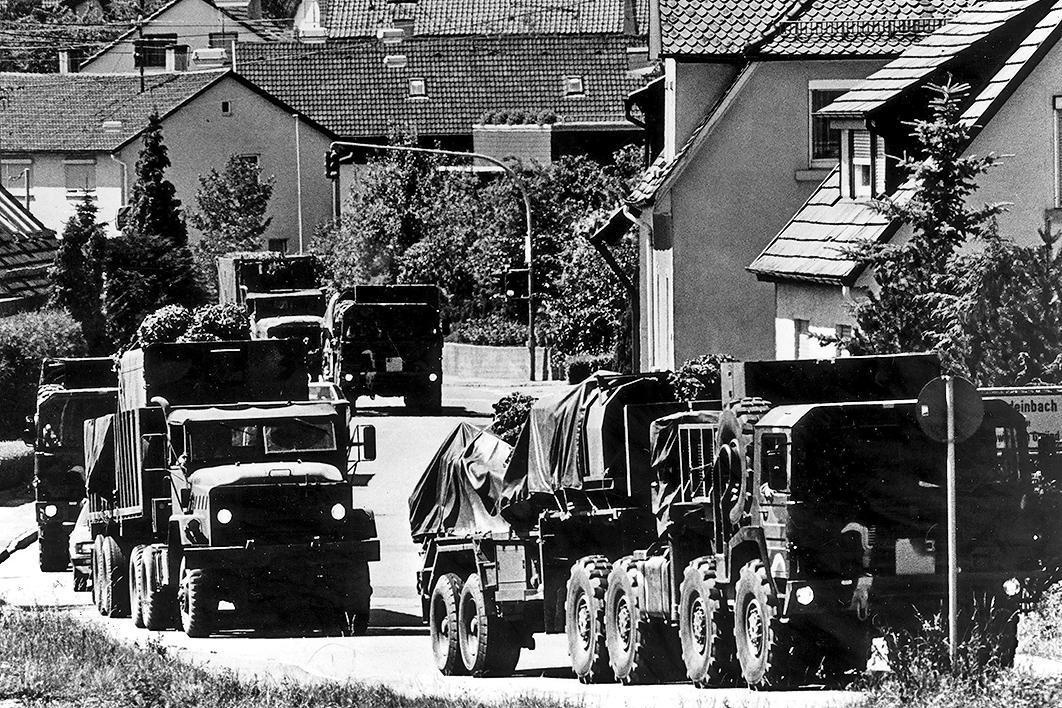Angst, one of the more common words borrowed by anglophones from German, entered the English language in the 1920s. It was a key term in the writings of Sigmund Freud and Martin Heidegger, and seemed to have no English equivalent. Like weltschmerz, another term that English struggles to translate, angst has sometimes been considered a distinctly German trait.
Outside observers of West Germany began diagnosing a peculiar “German angst” from the 1980s on. It was first detected in widely held fears that German forests would all but disappear because of acid rain, and it was said to inform West German opposition to the deployment of American nuclear Pershing II and cruise missiles in Europe.
In the United States and elsewhere in Europe, angst was also held responsible for Germany’s opposition to the 1991 and 2003 Iraq wars. Not only did outside observers depict postwar Germans as timid, apprehensive and anxious, but Germans also came to see this as a fair characterisation. In 1991, Otto Graf Lambsdorff, leader of the Free Democrats and a former senior minister in Helmut Kohl’s cabinet, explained to the New York Times Germany’s reluctance to participate in the war against Saddam Hussein’s Iraq. As the paper’s journalist reported:
Overriding all was “German angst,” which Mr Lambsdorff defined as “the fear of losing things hitherto taken for granted.” He called it a fear of losing political, social and even ecological stability. He said “German angst” was best expressed in the motto chosen for the German demonstrations [against the war in Iraq]: “We won’t let our future be destroyed.”
Just as the idea that Germans were perennially angst-ridden gained universal acceptance, something odd happened. Germans’ laid-back response to the 2007–08 global financial crisis and its aftermath confounded the same observers who had become used to associating Germany with a timid and somewhat neurotic collective disposition. With unemployment on the rise, Germany was certainly affected by the crisis, but Germans took the downturn in their stride.
In 2009, the long-time Berlin correspondent of the New York Times, Roger Cohen, wrote a much-discussed article in the weekend magazine of Süddeutsche Zeitung, one of Germany’s most respected broadsheets. He found that a nation that “like no other had embodied so precisely a sentiment which was more than simple fear but had not yet become panic” had responded with a lack of fear, “bordering on carefreeness,” to the worst recession since the Great Depression. “The world has been turned upside down: the situation is dire, but Germans are happy. Or, at least, they remain calm.” Cohen suggested that the world would do well to become used to these new Germans.
Germans’ response to the global financial crisis was not the first indication that the nation’s mood had changed. A carefree Germany had been on display in the summer of 2006, during the so-called Sommermärchen, the fairytale 2006 World Cup. The German team only came third, but that didn’t stop Germans from embracing the tournament, not just cheering on their own side but also generally being enthusiastic and generous hosts.
Cohen’s diagnosis remained valid in the wake of the Fukushima nuclear disaster. Many Germans certainly feared a similar catastrophe, but when these fears prompted the government, led by an unusually decisive Angela Merkel, to order the staggered decommissioning of the country’s nuclear industry, the decision’s impact on energy security created comparatively little concern. Similarly, during the eurozone crisis, Germans grumbled, but they did not use the opportunity to engage in collective doomsaying.
“The euro is teetering, neighbouring countries are complaining about pressure from Berlin, and the German chancellor is rushing from one crisis summit to another,” an English-language Spiegel Online article observed in December 2011. “Typically more anxious, the Germans appear to be strangely unperturbed amid the furore.” Reporting on the results of a survey for the Guardian in June 2014, Philip Oltermann suspected that the Germany of “weltschmerz and angst, a nation constantly terrified of pending nuclear doom and haunted by memories of hyper-inflation, a joyless people… belongs to the history books.”
Those trying to explain the comparatively laid-back mood of the new Germany often associated the demise of German angst with the country’s successful return to “normality.” This normality supposedly became possible once the two Germanys had been reunited and most members of the generation responsible for the horrors of Nazi Germany had died. Gerhard Schröder, who presided over a coalition government of Social Democrats and Greens from 1998 to 2005, regularly conjured this normality. He was the first postwar chancellor who could claim not to have any personal memories of Nazi Germany (he was born in April 1944).
Schröder himself was “a normal postwar German,” Cohen writes in his 2009 essay, “growing up without a father, who had died in war, forced to live with the pain but not allowed to talk about it, because the Germans’ losses were overshadowed by their crimes.” For Cohen, this newfound normality entailed the end of shame and guilt about the Nazi past, which made it possible to talk about what the loss of a father meant.
In recent weeks the debate about German angst has been given a new impetus with the publication of Frank Biess’s book Republik der Angst: Eine andere Geschichte der Bundesrepublik (“The Republic of Fear: An Alternative History of the Federal Republic”). Biess rewrites the history of West Germany between the late 1940s and the late 1980s as a history of its fears. He shows how pervasive these fears have been, and thereby casts doubt on the dominant view that pre-reunification West Germany was a remarkable success story.
This is one of the most incisive, original and substantive contributions to the history of contemporary Germany published in recent years. That may be partly because its author is not a history professor in Germany, but teaches German history at the University of California, San Diego. Being German-born and educated but American-based, he can combine the perspective of the outsider with that of the insider.
Biess goes along with the journalists’ diagnosis of a peculiarly German angst, but not because he sees it as a national pathological trait. The collective paranoias and anxieties of postwar Germany are not rooted in a national psyche, he believes, but emerged from Germany’s past — the Nazi regime and the Holocaust — and from memories of that past. In an article published last month, Biess and his co-author Astrid Eckert suggest that the much-debated thesis about a German Sonderweg — the unique trajectory that might account for Nazi Germany — could perhaps be turned on its head: “the real Sonderweg began in 1945,” they write, and was the result of the legacy of the Holocaust and of German fascism.
Unlike many of the journalists writing about German angst, Biess takes the fears seriously, even when they have turned out to be unfounded (as most of them have), rather than passes judgement. That is, he doesn’t follow the tendency among historians to pass judgement on earlier generations with the benefit of hindsight — with the knowledge, in this case, that worst-case scenarios did not eventuate. As far as postwar West German history is concerned, narratives that tell the past through the lens of its presumed outcomes all too often make success seem inevitable.
Biess describes several cycles of collective angst: fears of revenge at the hands of the victims of Nazi Germany in the late 1940s; fears triggered by the recruitment of German men by the French Foreign Legion in the 1950s; fears of a new war in the 1950s and 1960s; fears that workers would be replaced by robots; fears held by, or prompted by, the student protesters of the late 1960s; and fears of a nuclear Armageddon as a result of a malfunctioning nuclear power plant or an atomic war in the late 1970s and early 1980s. Some of these fears were informed by past experiences or memories of such experiences; others were projections shaped by an uneasiness about present developments. In every case, the angst eventually subsided.
Having grown up in West Germany in the 1960s, I recognise very well some of the fears described by Biess. When I was a child, I knew that I would have to make a quick decision about which of my belongings to take with me if an air-raid warning was sounded and we had to seek shelter in our cellar (where my parents kept supplies of tinned food for emergencies, though it wouldn’t have provided much protection). I gave much thought to the question of which toys to save and which to leave behind.
One evening, when I was eleven, my father announced that war was imminent. I went to school the next day and told my friends. Their parents hadn’t made similar predictions, but none of them thought I was mad. Later in life I tried to figure out what had happened at the time to alarm my father, but I couldn’t find news of any particular crisis in East–West relations at the time. We lived close to the German–German border, and I think he must have been concerned by one of the war games that were conducted regularly in the fields near our house. The fears I experienced were the result of experiences my parents had had: my father as a seventeen-year-old in the Wehrmacht, and my mother as a teenager whose home was destroyed in an air raid.
Later, like many of my generation of university students, I feared that one of the nuclear power stations being built in Germany would leak radiation. How ironic it would be, I thought, if we had so far survived the cold war unscathed only to fall victim to radiation sickness caused by an industry for which neither Russians nor Americans could be blamed.
Looking back at the first twenty-five years of my life from the vantage point of my life in Australia, I realised how I had been beholden to fears: of war, of a nuclear meltdown, of a resurgence of fascism and an all-too-powerful state. But on visits to Germany I also became aware of how the mood was changing. I first noticed a shift in the first half of 1989, after I had been away for almost four years. But what I experienced as a kind of West German Spring didn’t last beyond the end of that year, when the Berlin Wall came down and a feeling of impending doom returned.
Like Roger Cohen, I began to sense the emergence of a new, more relaxed Germany about ten years ago. From my perspective as a visitor, the old West Germany seemed at its most relaxed in the seventeen months from the 2014 World Cup win over Brazil until the late autumn of 2015, when the majority of Germans were still convinced that the accommodation of a million refugees was not only manageable but presented an opportunity to showcase a hospitable and relaxed Germany. East Germany was, of course, a different story.
When Roger Cohen published his essay about a carefree Germany in 2009, he assumed that Germans had dealt with their fears once and for all. Germans are “prouder, more relaxed,” he found. “These are profound transformations, which took decades. They won’t be easily undone.” He was wrong. German angst is back.
To start with, Germans are scared of Donald Trump. In a reputable survey done last year by a leading insurance company, 69 per cent of Germans said they feared that the world was becoming a more dangerous place because of the current US president. That was their greatest fear. Of course, people in many other countries, including the United States, would share that concern.
Germans are also afraid of the consequences of climate change. They are not alone in that either, but because of the long-lasting influence of the movement against nuclear power in the late 1970s and early 1980s, they are perhaps more attuned to environmental issues than, say, North Americans or Australians. When discussing the environmentalist movement of the 1970s and 1980s, Biess writes that the “mobilisation of ecological angst serves as a key means of enforcing political action.” But he cautions that when angst becomes chronic, people get used to it, which engenders paralysis rather than resistance. So far, the fear of global warming is still sufficiently acute to prompt Germans to demand, often successfully, that their government take action. In that sense, fear is a productive emotion.
Two other fears have significantly contributed to a mood change in the past three years. A minority of Germans fear migrants, particularly those from Islamic countries. They are afraid of cultural change and of having to share housing and other scarce resources. Often their fear leads them to follow demagogues of the far right who promise to guard Germany against being “swamped” by “waves” of foreigners who don’t speak German, don’t look German and don’t value German cultural practices. Others, possibly the majority, fear far-right extremists, right-wing populists and whatever other forces are out there exploiting the fear of non-white or Muslim others; but out of fear they sometimes condone demands put forward by those same right-wing populists.
Those fearful of the xenophobic minority are afraid not only because they don’t want anti-democratic parties such as the Alternative für Deutschland (Alternative for Germany, or AfD) to be represented in parliament and wield political influence. They are also afraid of the rage of those who believe that foreigners are transforming Germany — rage no longer reserved for asylum seekers or Muslims but now also directed at representatives of the media and of government, from the local village mayor to the federal chancellor.
The fears that are being instrumentalised by the AfD are not unique. Nor is the AfD. Those voting for Donald Trump in the United States, for Matteo Salvini’s Lega Nord in Italy or, most recently, for the Finns Party in Finland have much in common with the AfD’s voters. In the global north, fears of migrants in general, and those who arrive uninvited in particular, are widespread. In that respect, the mood in Germany is in fact comparatively relaxed. Think of the hostility evident in Hungary or Poland, for example. Not to mention that most extreme case of collective asylum seeker phobia, Australia.
What distinguishes Germany is that the fears providing oxygen to the far right are less significant than the fears of people who are afraid of the far right. So much for the normality that Schröder was fond of talking up. The angst after the AfD won 12.6 per cent of the vote at the 2017 federal elections — more than the Free Democrats, more than the Greens, and more than the Left — and became the strongest party in the largest East German state, Saxony, demonstrates how the Nazi past still shapes Germany’s economy of emotions.
Incidentally, the existential fears triggered by the stationing of American nuclear missiles in Germany and by the construction of nuclear power stations contributed to the early successes of the German Greens, who entered the Bundestag in 1983. In 2019 the Greens are once again the main beneficiaries of the fear of far-right extremism. In opinion polls they are currently ahead of the Social Democrats, and well ahead of the AfD.
The Greens are also benefiting from a heightened concern about the likely effects of global warming. But what we are seeing now is not a repeat of the environmentalist movement of the 1970s and 1980s. German students taking part in the Fridays for Future demonstrations are articulating a fear for our planet. Previously, one of the characteristics of German angst had been the egotism that went with it. Germans concerned about the effects of acid rain feared that their forests would die. The hundreds of thousands of Germans who demonstrated against the deployment of Pershing II missiles were scared of a nuclear war on German soil. Those opposed to nuclear power stations were afraid that they would be affected by a core meltdown.
The focus on German angst has tended to be as blinkered as German angst itself. Fear in Germany is more than German angst. Germans who tell me that they don’t venture outside after dark for fear of being assaulted by young men who arrived as asylum seekers may genuinely believe that they aren’t safe, and it often makes little sense trying to contradict perceptions by citing crime statistics. But in some parts of Germany, those young men themselves are too afraid to venture outside after dark, and they could refer to crime statistics to back up their fears. A history of the phenomenon of angst in postwar Germany could easily dismiss non-German perspectives. It is to Frank Biess’s credit that he acknowledges this issue, although he does not discuss it in any detail in his book.
In the epilogue to Republik der Angst, Biess suggests countering right-wing populism by mobilising the fear of a demise of liberal democracy and a pluralistic society. I am not convinced. Germans belonging to the so-called silent majority who still vote overwhelmingly for democratic parties are already letting their politics be dictated by fear. But that fear does not spur them to action.
It seems to me that it might be more productive to mobilise a related emotion, namely anger: about the undue influence right-wing populists have on some areas of government policy (such as refugee policy) and the disproportionate amount of time granted to them on television to expound their views. Another disposition, however, is needed at least as urgently. As long as the fear of the far right is sufficiently pervasive to jeopardise an effective defence of a multicultural, liberal Germany, courage is more important than yet more fear.
I would also be wary of Biess’s strategy because fear is not an emotion that can be easily predicted or managed. This is something that his book demonstrates well. Sometimes fears resist being mobilised or contained, he writes: “As we all know from experience, emotions can’t always be controlled by means of deliberate manipulation.” •





